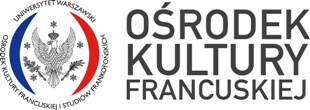04/06/24 – The consequences of the Russian invasion of Ukraine for the EU’s Eastern Partnership – with the participation of prof. Laure Delcour from Université Sorbonne Nouvelle

Center for French Culture and Francophone Studies at the University of Warsaw, Faculty of Political Science and International Studies at the University of Warsaw invite you to the “Geopolitical Tuesday” seminar entitled:
The consequences of the Russian invasion of Ukraine for the EU’s Eastern Partnership / with the participation of prof. Laure Delcour from Université Sorbonne Nouvelle
which will be held on Tuesday 4th of June 2024 at 3 pm (CET)
Inscription : seminarium.okf@uw.edu.pl
The seminar will be held in English.
Abstract
Russia’s war of aggression reverberates well beyond Ukraine. It bears far-reaching implications for both Eastern European and South Caucasus countries and EU policies in the region. First, Russia’s aggression entails major risks of destabilisation of smaller countries, which find themselves in complex situations as they are both domestically fragile and closely linked to Russia, even though to different degrees. Second, Russia’s war in Ukraine has also had major effects – even if indirectly – on some other conflicts in the region. Third, Russia’s full-scale invasion fundamentally questions the premises upon which the EU has interacted with the countries located on its borders over the past two decades. This is because the EU’s vision of its periphery was premised upon a dichotomy between future EU members, on the one hand; and countries without any membership perspective in the short- to medium-term, on the other hand. Whereas the former group was included in the EU’s enlargement policy, the latter joined the ENP. This vision collapsed abruptly as a result of Russia’s invasion and Ukraine’s, Moldova’s and Georgia’s subsequent applications to the EU. However, the EU faces a number of challenges in revising the existing policy frameworks vis-à-vis Eastern Europe and South Caucasus.
Bio
Laure Delcour is an Associate Professor of International Relations and EU Studies, University Sorbonne Nouvelle (Paris). She has lectured on EU external action, the ENP and EU-Russia relations at Sciences-Po Paris, Sciences-Po Strasbourg, INALCO Paris, and MGIMO (Moscow). Her research interests focus on the diffusion and reception of EU norms and policies as part of the European Neighbourhood Policy, as well as region-building processes in Eurasia. She acted as a coordinator or researcher in several EU-funded and French-funded research projects on these topics. She is currently conducting a French-Austrian research project (ANR-FWF) on civil society’s participation in the policymaking process in the EU’s neighborhood and a Horizon Europe project on Political perspectives for the Eastern Neighbourhood and the Western Balkans. Her research has appeared in Democratization, Journal of European Integration, Contemporary Politics, Contemporary Security Policy, Problems of Post-Communism, European Security and East European Politics, as well as several monographs and edited volumes.
